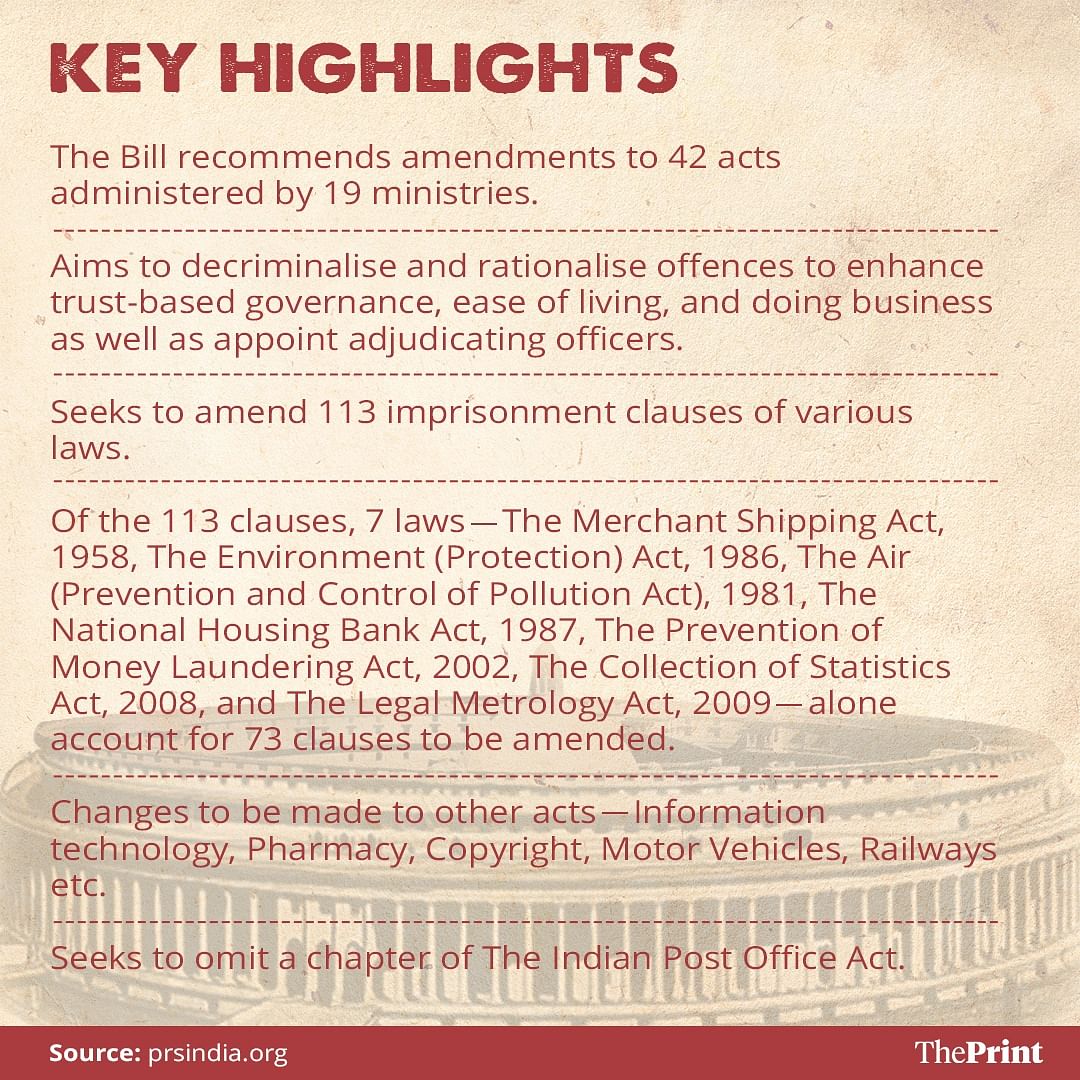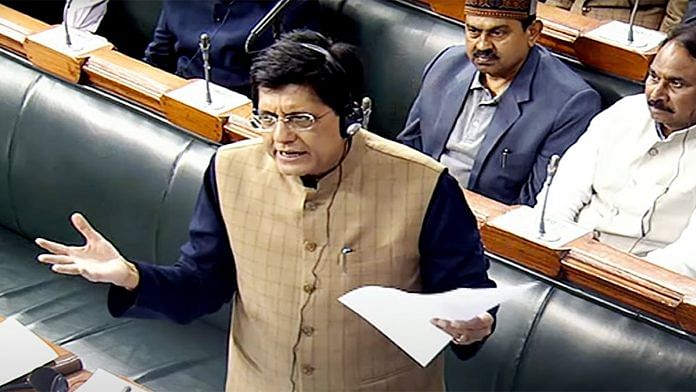New Delhi: Amendments to 42 acts administered by 19 ministries, decriminalising and rationalising offences to enhance trust-based governance, ease of living and doing business — that is what is envisaged in the Jan Vishwas (Amendment of Provisions) Bill, 2022, tabled in the Lok Sabha last month.
Introduced by Commerce and Industry minister Piyush Goyal during the Winter session, the Bill seeks to replace imprisonment penalties with monetary penalties, allowing parties to freely do business. It seeks to amend almost 113 imprisonment clauses in various legislations governing environment, air pollution, housing, money laundering, etc. Seven laws cumulatively account for 73 of these clauses.
With 22 changes proposed, the Merchant Shipping Act, 1958 — which aims to foster marine infrastructural development — would have the maximum imprisonment provisions that will be substituted with financial liabilities.
Further, the Bill has proposed a 10 per cent increase in the minimum penalty, to be reviewed every three years — after it becomes law.
The Bill has been referred to a 31-member joint committee for scrutiny.
ThePrint brings key highlights of the Jan Vishwas (Amendment of Provisions) Bill and important acts that will undergo changes, once the Bill becomes law:

Environment protection law
According to the Bill, 12 clauses of the Environment (Protection) Act, 1986, are likely to contain only monetary penalties.
The changes are suggested even for inadvertent compliance breaches, such as Sections 7 and 9 of the Act that penalise excess discharge of pollutants. Presently, non-compliance of these two sections carries a jail term of 5 years and a fine of Rs 1 lakh. Post the amendment, it shall involve a fine ranging between Rs 1 lakh and Rs 15 lakh.
Similar provisions — such as the inspector being unable to collect samples because of failure to provide assistance — has a prison term running up to more than five years. But the same would now be replaced with a fine up to Rs 5 lakh.
Also Read: All about Modi govt’s new draft rules for online gaming — KYC to skirting ‘skill vs chance’ debate
Air pollution
The Bill also seeks to alter the Air (Prevention and Control of Pollution) Act, 1981.
Under the Act, currently there is a six-year jail term and a fine of Rs 10,000 for excess emissions than those laid down by the State Board. But the amendment proposes to change this to a minimum fine of Rs 10,000 and up to a maximum of Rs 15 lakhs.
Interestingly, the Bill also intends to come down harshly on government employees. In case of contravention by government departments, it introduces a new penalty as ‘one-month basic salary’ of the employee. This penalty will not be applicable if it can be shown that it was without his knowledge or instructions or that the officer exercised all due diligence.
Information Technology
The Bill also proposes to decriminalise six clauses in the Information Technology Act, 2000.
The proposed amendments include penalties for failure to surrender license; for failure of intermediaries to preserve information; and for breach of confidentiality and privacy.
Most importantly, it seeks to delete Section 66 of the IT Act, which makes it a punishable offence for any person to send offensive information using a computer or any other electronic device.
Notably, in a 2015 landmark decision of the Supreme Court, the provision had been struck down with the court terming it “open-ended and unconstitutionally vague”.
Also Read: Is 18 old enough to vote but too young to contest polls? Election Commission thinks so
Relieving pain points
It also amends the Legal Metrology Act — a 2009 law that, among other things, provides for standards of weights and measures.
The Bill proposes to decriminalise four sections — Section 25 (use of non-standard weight or measures), Section 27 (manufacturing of non-standard weight or measures), Section 28 (making transactions in contravention of the prescribed standards), and Section 31 (non-production of documents).
The Jan Vishwas Bill further amends the Food Safety and Standards Acts, 2006, the food safety law in India, with changes to penalties for refusal to surrender license, furnishing information, and failure to file return. For instance, where an entity refuses to surrender its license, the current law carries a six month prison term or a fine of up to Rs 10,000, or both. The Bill does away with the imprisonment — and calls for a higher penalty up to Rs 5 lakh.
Similarly, offences for providing false information and carrying a business without license — which carried imprisonment of three months and six months respectively — will not have any jail term. But one of the proposed amendments in the Bill provides for an increase in fine for this offence. For providing false information, a violator would have to pay Rs 3 lakh (up from Rs 1 lakh), and Rs 10 lakh (up from Rs 2 lakh) for continuing a business without a valid license.
Cinematograph Act to become stricter
A raft of amendments proposed for The Cinematograph Act, 1952 — to make provision for the certification of cinematograph films for exhibition and for regulating exhibitions — will intend to make the existing law stricter.
Additional clauses to the law have created new offences under act. The Bill proposes to punish a person who alters or tampers with any film after it has been certified, with three years of imprisonment or a fine of Rs 10 lakh, or both.
Similarly, exhibition of a film not certified by the Censor Board, or its exhibition without the mark of the Board or with a tampered mark of the board would now carry a jail term of three years or a fine up to Rs 10 lakh, or both. A further fine of Rs 1 lakh per day would be imposed if the offence continues.
In case a film certified by the Board as “A” is exhibited to any minor then the person who does so shall be liable to pay a penalty not exceeding Rs 10,000 per person for every such screening.
The new provisions also impose a penalty on the person who fails to deliver a certified film to a distributor or exhibitor. Whoever fails to comply with this provision shall be liable to pay Rs 5 lakh that will be levied by the authorised officer designated under the law.
Also Read: How census-based delimitation for Lok Sabha seats could shake up politics & disadvantage south
Pharmacy, Copyright & others acts
The Pharmacy Act would also see some changes once the Jan Vishwas Bill is finalised. Penalty for wilful obstruction of an inspector — who carries out checks of pharmacy shops — under the present law is six-month imprisonment or a maximum fine of Rs 1,000, or both. While doing away with imprisonment, the recommendation in the Bill is to increase the penalty to Rs 1 lakh.
Further, for persons claiming false registrations, it amends the first penalty from a maximum of Rs 500 to Rs 50,000. For subsequent convictions, it removes the six-month imprisonment and increases the erstwhile Rs 1,000 penalty to Rs 1 lakh.
In a situation where an unregistered person dispenses medicine, it does away with the six-month prison time while increasing the penalty from Rs 1,000 to Rs 1 lakh.
The act also removes certain penalties which were provided earlier — including Section 68 of the Copyright Act (false statement to deceive or influence an authority or officer).
Furthermore, for driving vehicles without permits, Section 192A of the Motor Vehicle Act provides for both — a six-month imprisonment and a fine of Rs 1 lakh.
However, the amendment allows for discretion to either go ahead with the imprisonment, the penalty, or both.
Omitted
The Bill envisages to omit a chapter from the Indian Post Office Act that penalises a person, employed to carry or deliver mail bags or postal articles, for voluntary withdrawal from duty without permission or notice.
Penalties for making false entry in register kept by person employed to carry or deliver any postal articles, for theft, dishonest misappropriation, secretion, destruction, or throwing away of postal articles, opening, detaining or delaying postal articles, for fraudulently preparing, altering, secreting or destroying Post Office documents and sending unpaid postal articles shall also be deleted post amendment.
(edited by Anumeha Saxena)
Also Read: IT Ministry’s new draft rules propose ban on betting in online games, moots self-regulatory body



